The Cross-Bay Swim
Walking is not the only way people used to cross the treacherous Morecambe Bay. The long-distance Cross-Bay Swim Championship was held annually between 1907 and 1991 - with the exception of a few cancellations due to war or weather.
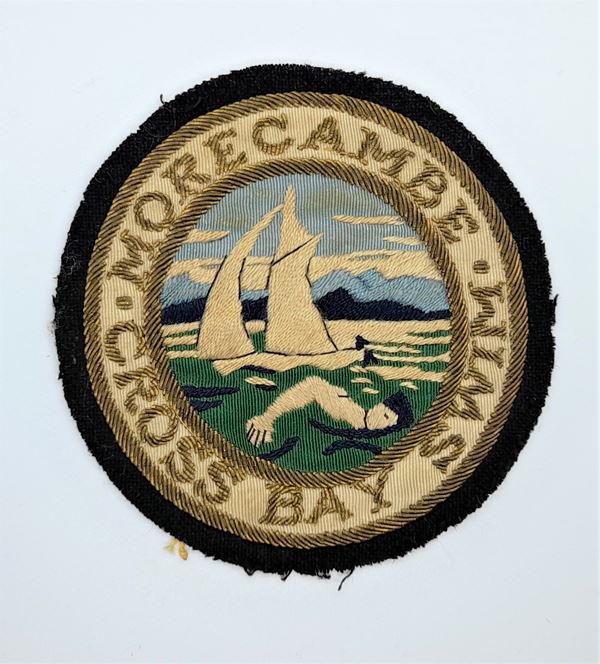
After the excitement of the first attempt in 1907, the Cross Bay Swim immediately became a regular event. The contest was limited to men at first but a women’s championship was added just a few years later, in 1912.
The swim was only made possible by the Morecambe Bay fishermen, who acted as pilots; the only people to truly know the eddies and currents and the extreme dangers of the Bay. The intrepid swimmers, pilots and the timekeepers were all ferried to Grange-over-Sands in escort trawlers. These also towed the rowing boats that would accompany the swimmers across the Bay to Morecambe.
Large crowds would gather on Grange Promenade to watch the start of the race and likewise at West End Sands in Morecambe, to see the swimmers come in to land. At the signal, the swimmers took to the water and started to swim, each following their own dedicated pilot boat.
The length of the route from Grange-over-Sands to Morecambe varies, thanks to the shifting sands and currents of the Bay, but it’s usually about ten miles long and takes most swimmers around four hours to complete. The record times for both men and women were both set in 1914 and are a little over two hours. (The currents must have been favourable that year!)
Maud Wensley
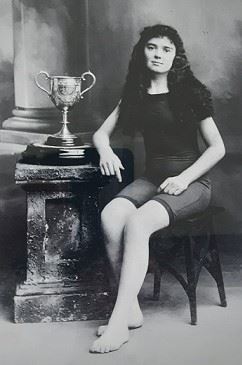
To this day, Maud Wensley of Blackburn holds the women's record for her time of 2 hours 21 minutes which won her the championship in 1914.
She'd already become the first woman to complete the course two years earlier, but was disqualified on a technicality on that occasion, after a strong tide swept her off course and she finished out of bounds.
Thanks to Maud's grandchildren Jane Broomfield and David Palmer Davies for this information.
Find out more about Maud here: Cotton Town - Blackburn with Darwen
Ethel ‘Sunny’ Lowry
In 1933 there was a special swim by Ethel ‘Sunny’ Lowry MBE, the first British woman to swim across the channel. The event attracted the largest crowd ever to watch a swim (according to news reports at the time), with an estimated 20,000 people. Many paid a small pier toll to watch, and she completed the swim in 3hrs 35mins. Unfortunately the spectacle ended in disappointment after Sunny's time was officially disregarded, because she stopped and stood up on a sandbank two miles from Morecambe, thinking she had reached the shore. Morecambe Bay was, according to Sunny, 'more difficult than the Cross-Channel swim'.
One can’t help but think of the Victoria Wood sketch about the young channel swimmer.
Professor William Stearne – Not one the locals will forget!
41-year-old Professor Stearne of Manchester was the first person known to have swum across the Bay, on 13 July 1907. He was in training to swim across the Channel and was asked to try the route after a group of local swimmers had made an unsuccessful but promising attempt.
Now, we are told never to swim after eating, but not Stearne. It is said that before swimming across the Bay he ate an enormous meal consisting of soup, bread, steak and potatoes, two helpings of boiled salmon. He even managed to eat between 12 and 15 eggs, drank a quart of milk from a sippy cup, a quart of beef tea, some chunks of chicken. During the swim he took off his costume. He said it was too heavy. When he arrived in Morecambe after 3 hours 45 minutes and 41 seconds, it was said that he left the water backwards to protect his modesty!
Charles Daly
Manchester seems to have produced a series of winning Cross Bay swimmers, including Charles Daly, who took part no less than 29 times and won on three occasions in the 1920s and 30s.
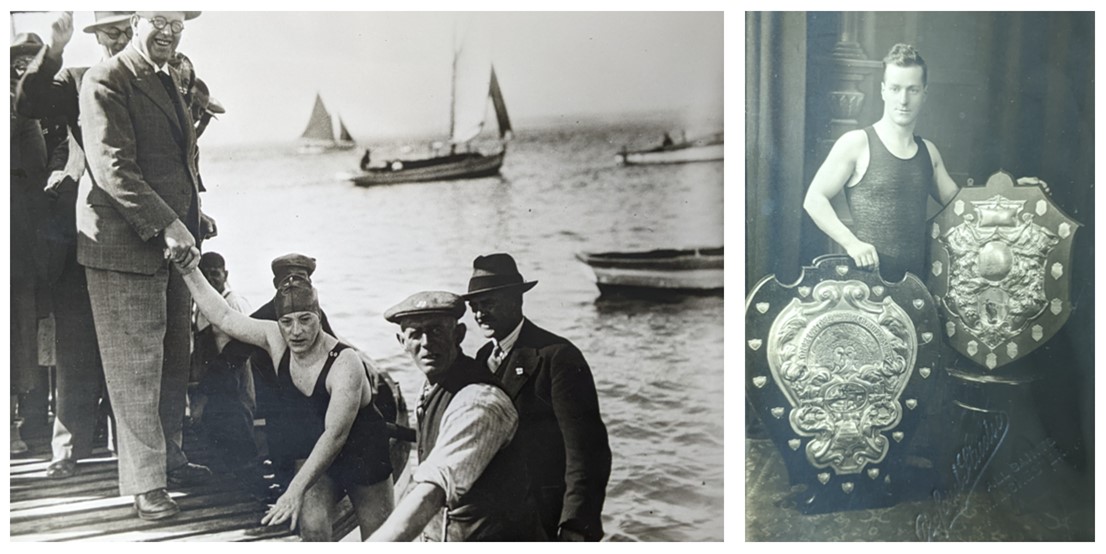
Other Notable Swimmers
The youngest competitors were May Adams, who was only 13 years old when she swam the race, and Alan Gorton, who was 14 years old, both from Chadderton, Oldham.
Curiously, the winner of the first official championship in 1907 also came from Chadderton. Brierley Law completed the course from Grange to Morecambe in a time of 3 hours 5 minutes. He went on to swim the bay another eleven times over the next forty years, winning the championship six times in total. His last cross-bay swim was in 1948, at the age of 66.
Our Collection
We have many more photos that show competitors and scenes from the cross-bay swim in the mid-20th century. Here are a few of the best:
- Top left - Morecambe Mayor Harold Robinson presents the championship shield to Commander Gerald Forsberg.
- Bottom Left & Centre - swimmers surrounded by crowds.
- Top Right - swimmers standing up in in pilot boats.
- Bottom Right - champion with trophy, and 15 year old swimmer Walter Nixon of Keighly exiting the water in 1954.
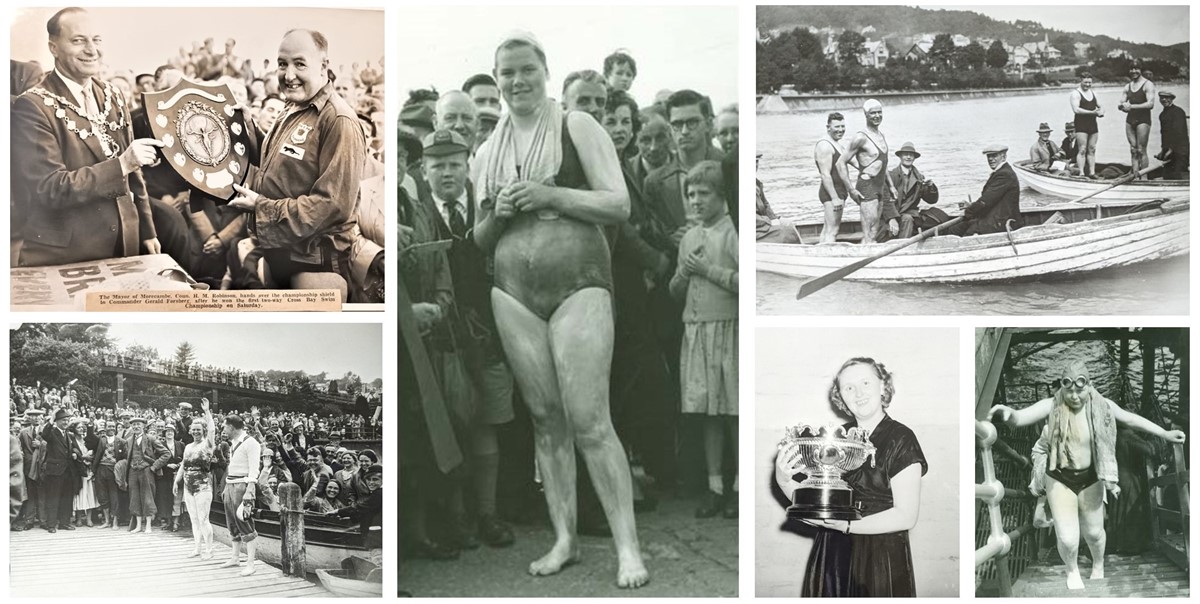
The End of the Championship
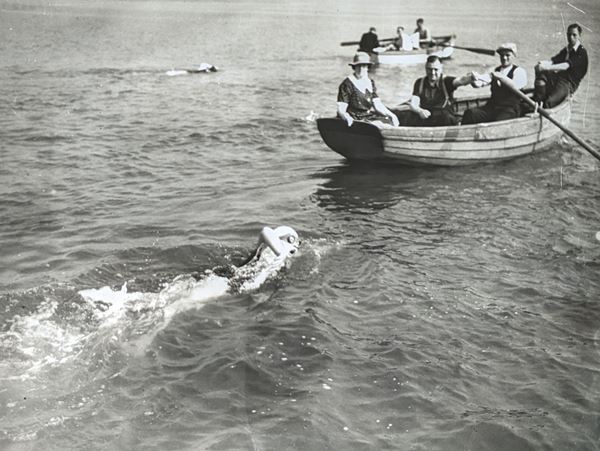
After 84 years, the Cross-Bay Swim Championship was suspended in 1991. The causes of its demise were essentially the same factors that made the swim so challenging in the first place: the changing currents and shifting sands of Morecambe Bay. In the latter years of the championship, contestants and their pilots often found their routes blocked by sandbanks or clogged by seaweed. Eventually it was decided that Morecambe Bay was simply no longer a practical location for the championship.
More Information
- Watch a Pathe News film clip of the 1937 championship here: Morecambe Bay Swimming (1937)
- Find more photos and information here: Grange-over-Sands History - Cross Bay Swim
- Or read a history of the event here: British Long Distance Swimming Association - Morecambe Cross-Bay Championships
- Recording Morecambe Bay also has a collection of photos and information on the cross-bay swim, including this detailed article: Morecambe Cross - Bay Swimming 1907-1991


